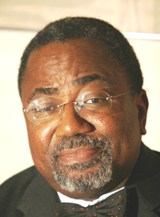Head of Darfur hybrid peacekeeping mission optimistic
July 7, 2007 (KHARTOUM) — The head of the planned hybrid African Union-UN peacekeeping force for Sudan’s war-torn western Darfur region is optimistic for his mission while acknowledging the complexity of the task.

In an interview with a group of journalists including AFP, Adada also said that despite everything, he is looking to tackle his new mission with “enthusiasm and hope.”
After drawn-out talks, Sudanese President Omar al-Beshir agreed on June 17 to the deployment of the hybrid force to replace an ill-equipped, 7,000-strong AU contingent that has been unable to stem the civil war raging in the vast desert.
The United Nations is currently drafting a resolution to fund the estimated 15,000 personnel — 10,000 troops and 5,000 support personnel — to be provided by its member states to supplement a 3,000-strong UN contingent that is to serve as the backbone of the force.
These new forces will provide logistical support to the AU force currently in Darfur.
The conflict began in 2003 when ethnic minority rebels rose up against the Arab-dominated government in Khartoum, which then enlisted the Janjaweed militia to help crush the rebellion.
According to UN estimates, at least 200,000 people have died from the combined effect of war and famine and two million were forced to flee their homes. Other sources give a much higher death toll, but Khartoum disputes the figures.
Adada, who arrived in Khartoum on Friday, will head the African mission in Sudan (AMIS) while the new force is put into place and will be working to save the foundering mission that is in danger of losing its largely European funding.
“The support for AMIS, which we already have from our partners, is today indispensable to the success of the mission,” he said amid African fears the Europeans are reluctant to continue financing the operation.
“The most important thing today is to support AMIS because this will guarantee the continuation of the operation and the success of the hybrid mission,” he said. “This is the message we must convey to our generous partners.”
The other major challenge, he said, is to reach a political solution to the Darfur crisis which has been complicated by the fact that rebel groups who did not sign a 2006 peace agreement are fragmented into many small groups.
“It is clear that a peacekeeping mission will only work backed by a political accord,” he said, adding the efforts of the UN and AU could well make the agreement succeed.
UN envoy Jan Eliasson, is currently in Khartoum working on a political solution to the crisis ahead of an international meeting on the matter in Libya set for July 15 and 16.
On Saturday, Adada’s African colleague Salim Ahmed Salim was to arrive in Khartoum as well, the fourth such visit since the UN and AU decided to work together on the crisis.
Adada, who will be visiting the AU force in Darfur in the coming days, said he will also be counting on the cooperation of the Sudanese government for the success of his mission.
“In a mission like this, nothing can be done without the support of the Sudanese government,” he said.
(AFP)
